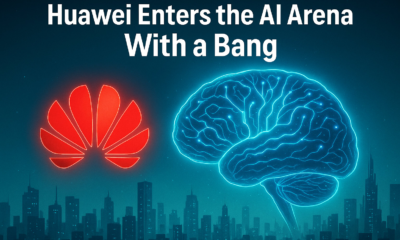( September 2, 2025, 05:24 GMT | Official Statement) — MLex Summary: South Korea’s cabinet council today approved the regulation on the establishment of a new presidential committee as the highest apparatus to review, coordinate and decide policy on artificial intelligence. The National AI Strategy Committee will be chaired by President Lee Jae Myung and will include at least one full-time vice-chairperson, while 13 ministers and ministerial officials will serve as members along with many others. In theory, the committee is being newly established, but in effect it will replace the Presidential Committee on AI created by the previous government.The statement, in Korean, is attached….
AI Research
The New Imperative for Marketers

Marketers must become expert “creative directors” for AI systems, crafting detailed briefs that produce on-brand, engaging content at scale.
The marketing landscape is experiencing its biggest transformation since the digital revolution. Agentic AI marketing skills have become the defining factor between marketers who thrive and those who get left behind in 2025.
Unlike traditional AI tools that require constant human input, agentic AI systems work autonomously—launching campaigns, optimizing customer journeys, and making strategic decisions without continuous oversight. For marketers, as outlined in Salesforce’s latest post, this shift demands an entirely new skill set focused on orchestration, ethics, and strategic thinking.
What Makes Agentic AI Marketing Skills Different?
Agentic AI marketing skills represent a fundamental shift from task execution to strategic orchestration. While previous generations of marketing AI simply assisted with content creation or data analysis, agentic AI systems take complete ownership of marketing processes.
These intelligent systems can:
- Autonomously launch and optimize multi-channel campaigns based on predefined KPIs
- Write, schedule, and personalize content following brand guidelines and audience preferences
- Manage complex customer segmentation and journey mapping in real-time
- Adjust strategies dynamically using comparative models and performance data
This transformation elevates marketers from tactical executors to strategic commanders, requiring mastery of distinctly human capabilities that AI cannot replicate.
Marketing Skills Becoming Obsolete in the Agentic AI Era
The reality check: Several traditional marketing skills are rapidly losing relevance as agentic AI systems outperform humans in key areas.
Disappearing marketing capabilities:
Manual reporting and dashboard creation – Agentic AI generates real-time analytics automatically, eliminating hours of spreadsheet work and data compilation.
Basic content writing and copywriting – AI agents can produce first drafts of emails, social posts, and ad copy in seconds, following brand voice guidelines more consistently than human writers.
Workflow setup and campaign management – Autonomous systems create, manage, and refine customer journeys based on performance data, removing the need for manual campaign orchestration.
Traditional audience segmentation – Predictive AI models target micro-audiences in real-time with precision that surpasses human intuition and demographic assumptions.
This transition frees marketers to focus on high-level strategy, creative direction, and the uniquely human elements that drive meaningful brand connections.
The 5 Critical Agentic AI Marketing Skills for 2025
1. Strategic Orchestration and Systems Thinking
Why it matters: Agentic AI excels at execution but requires sophisticated strategic frameworks to operate effectively.
Core competencies:
- Journey-based marketing design that maps entire customer lifecycles, not just individual campaigns
- Strategic goal translation – converting brand strategy into actionable AI agent instructions
- Performance validation – testing AI outputs against strategic objectives and business goals
- Cross-platform integration – ensuring AI agents work cohesively across CRM, marketing automation, and analytics systems
Skill development pathway: Master customer lifecycle mapping and learn to write clear, measurable objectives that AI agents can execute autonomously.
2. Creative Direction and AI Prompt Engineering
The new reality: Marketers must become expert “creative directors” for AI systems, crafting detailed briefs that produce on-brand, engaging content at scale.
Essential capabilities:
- Advanced prompt engineering – creating structured, contextual prompts that generate consistent brand voice and tone
- Creative constraint definition – setting parameters that guide AI creativity while maintaining brand standards
- Multi-format creative strategy – directing AI systems to create cohesive campaigns across video, audio, visual, and written content
- Brand voice translation – converting subjective brand guidelines into concrete AI instructions
Professional development focus: Practice writing creative briefs for both human teams and AI systems, then compare outputs to refine your prompt engineering skills.
3. AI Systems Literacy and Technical Fluency
Beyond basic AI knowledge: Marketing professionals need deep understanding of how agentic systems make decisions, learn from data, and interact with marketing technology stacks.
Technical skill requirements:
- AI model selection and optimization – understanding when to use different AI models for specific marketing tasks
- Feedback loop design – creating systems that help AI agents learn and improve performance over time
- API integration knowledge – connecting AI agents with CRM, CMS, DAM, and analytics platforms
- Performance monitoring – tracking AI decision-making patterns and identifying when human intervention is required
Learning pathway: Take formal training on marketing AI platforms, experiment with AI agent configuration, and develop basic understanding of machine learning principles.
4. Ethical AI Governance and Compliance Management
Critical importance: As AI systems make autonomous decisions affecting customer experiences, marketers must ensure ethical, legal, and brand-safe operations.
Governance competencies:
- Algorithmic bias detection – identifying and mitigating unfair targeting or discriminatory practices in AI-driven campaigns
- Privacy compliance leadership – ensuring AI systems operate within GDPR, CCPA, and emerging data protection regulations
- Transparency and disclosure – clearly communicating AI usage to customers and stakeholders
- Risk assessment and mitigation – evaluating potential negative outcomes of autonomous AI marketing decisions
Skill building approach: Study marketing ethics frameworks, learn privacy regulation requirements, and practice auditing AI outputs for bias and compliance issues.
5. Human-AI Team Leadership and Collaboration
The orchestration imperative: Modern marketers must expertly coordinate hybrid teams of humans and AI agents across departments, platforms, and workflows.
Leadership skill areas:
- Role definition and delegation – determining which tasks belong to humans vs. AI agents
- Cross-functional AI integration – coordinating AI marketing efforts with sales, customer success, and product teams
- Change management – helping marketing teams adapt to AI-augmented workflows
- Performance optimization – continuously improving human-AI collaboration effectiveness
Practical skill development:
- Human-only responsibilities: Brand strategy, ethical oversight, creative storytelling, relationship building
- Human-AI partnership zones: Content ideation, campaign conceptualization, performance analysis
- AI-autonomous domains: A/B testing, bid optimization, audience targeting, reporting generation
Implementation Strategy: Leading with Intent in the Agentic AI Era
The bottom line: Successful adoption of agentic AI marketing skills requires intentional leadership, not passive acceptance.
Your competitive advantage strategy:
Start with strategic clarity – Define clear business objectives and success metrics before implementing any AI agents. Agentic systems amplify strategy, so poor strategy leads to amplified failure.
Experiment rapidly but systematically – Test AI agent capabilities in controlled environments before full deployment. Start with low-risk campaigns to understand AI decision-making patterns.
Maintain human oversight – Even autonomous systems require human strategic guidance, ethical monitoring, and creative input.
Focus on uniquely human value – Use AI to eliminate busywork while doubling down on relationship building, creative storytelling, and strategic thinking that only humans can provide.
The Future of Marketing Careers: Human Leadership + AI Execution
Agentic AI marketing skills represent more than just technical competencies—they’re the foundation of marketing leadership in an AI-native business environment.
The most successful marketers in 2025 won’t be those who resist AI or those who rely on it completely. Winners will be strategic orchestrators who leverage AI agents for execution while maintaining human leadership over brand direction, ethical decisions, and creative vision.
AI Research
New Akamai-Commissioned Research Reveals GenAI is Driving “The Edge Evolution”: 80% of APAC CIOs to Rely on Edge Services by 2027 to Support AI Workloads
- Akamai-commissioned research reports future-proofing digital business infrastructure as the top technology initiative for CEOs in Asia-Pacific organizations
- Leading analyst firm predicts that by 2027, 80% of CIOs will turn to edge services from cloud providers to meet the performance and compliance demands of AI inferencing
- 31% of enterprises have moved GenAI applications into production, with 64% in testing phase, forcing an infrastructure rethink
SINGAPORE – Media OutReach Newswire – 2 September 2025– As generative AI becomes essential to business operations, organizations are being forced to rethink outdated infrastructure models, finds a new IDC research paper commissioned by Akamai Technologies (NASDAQ: AKAM), the cybersecurity and cloud computing company that powers and protects business online. According to the research paper titled “The Edge Evolution: Powering Success from Core to Edge,” Asia-Pacific (APAC) enterprises are realizing that centralized cloud architecture alone is unable to meet the increased demands of scale, speed, and compliance. It is crucial that businesses rethink and enhance infrastructure strategies to include edge services to stay competitive and compliant, and be ready for real-world AI deployment.
According to the IDC Worldwide Edge Spending Guide – Forecast, 2025, public cloud services at the edge will grow at a compound annual growth rate (CAGR) of 17% through 2028, with the total spending projected to reach US$29 billion by 2028. In addition, in the latest research paper, IDC predicts that by 2027, 80% of CIOs will turn to edge services from cloud providers to meet the performance and compliance demands of AI inferencing. This shift marks what is emerging in the paper as “The Edge Evolution.”
The research paper further outlines how public cloud-connected systems combine the agility and scale of public cloud with the proximity and performance of edge computing, delivering the flexibility businesses need to thrive in an AI-powered future.
The AI infrastructure reality check
As generative AI moves from experimentation to execution, enterprises across APAC are confronting the limits of legacy infrastructure. Today, 31% of organizations surveyed in the region have already deployed GenAI applications into production. Meanwhile, 64% of organizations are in the testing or pilot phase, trialing GenAI across both customer-facing and internal use cases. However, this rapid momentum is exposing serious gaps in existing cloud architectures:
- Complexity of multicloud: 49% of enterprises struggle to manage multicloud environments due to inconsistent tools, fragmented data management, and challenges in maintaining up-to-date systems across platforms.
- Compliance trap: 50% of the top 1,000 organizations in Asia-Pacific will struggle with divergent regulatory changes and rapidly evolving compliance standards, and this will challenge their ability to adapt to market conditions and drive AI innovation.
- Bill shock: 24% of organizations identify unpredictable rising cloud costs as a key challenge in their GenAI strategies.
- Performance bottlenecks: Traditional hub-and-spoke cloud models introduce latency that undercuts the performance of real-time AI applications, making them unsuitable for production-scale GenAI workloads.
“AI is only as powerful as the infrastructure it runs on,” said Parimal Pandya, Senior Vice President, Sales, and Managing Director, Asia-Pacific at Akamai Technologies. “This IDC research paper reveals how Asia-Pacific businesses are adopting more distributed, edge-first infrastructure to meet the performance, security, and cost needs of modern AI workloads. Akamai’s global edge platform is built for this transformation – bringing the power of computing closer to users, where it matters most.”
Daphne Chung, Research Director at IDC Asia-Pacific, added, “GenAI is shifting from experimentation to enterprise-wide deployment. As a result, organizations are rethinking how and where their infrastructure operates. Edge strategies are no longer theoretical – they’re being actively implemented to meet real-world demands for intelligence, compliance, and scale.”
Key findings for APAC:
- China scales GenAI with edge and public cloud dominance: 37% of enterprises have GenAI in production and 61% are testing, while 96% rely on public cloud IaaS. Edge IT investment is accelerating to support remote operations, disconnected environments, and industry-specific use cases.
- Japan accelerates AI infrastructure despite digital maturity gap: While only 38% of Japanese enterprises have GenAI in production, 84% believe GenAI has already disrupted or will disrupt their businesses in the next 18 months, and 98% plan to run AI workloads on public cloud IaaS for training and inferencing workloads. Edge use cases like AI, IoT, and operational support for cloud disconnection are driving infrastructure upgrades.
- India expands edge infrastructure to meet GenAI demand and manage costs: With 82% of enterprises conducting initial testing of GenAI and 16% leveraging GenAI in production, India is building out edge capabilities in tier 2 and 3 cities. 91% of GenAI adopters rely on public cloud IaaS, but cost concerns and skills gaps are pushing demand for affordable, AI-ready infrastructure.
- ASEAN embraces GenAI with edge-first strategies beyond capital hubs: 91% of ASEAN enterprises expect GenAI disruption within 18 months, with 16% having introduced GenAI applications into the production environment and 84% in the initial testing phase. 96% are adopting public cloud IaaS for AI workloads, while edge investment is rising to support remote operations and data control.
Building a cloud-connected future
To stay ahead, enterprises must modernize infrastructure across cloud and edge, aligning deployments with specific workload needs. Securing data through Zero Trust frameworks and continuous compliance is essential, as is ensuring interoperability to avoid vendor lock-in. By tapping into ecosystem partners, businesses can accelerate AI deployment and scale faster, smarter, and with greater flexibility.
Download the full IDC InfoBrief, commissioned by Akamai, “The Edge Evolution: Powering Success from Core to Edge“, August 2025, IDC Doc #AP242522IB, to explore strategic insights and recommendations for building cloud-connected, AI-ready infrastructure across APAC.
Hashtag: #Akamai
![]() https://sg.linkedin.com/company/akamai-technologies
https://sg.linkedin.com/company/akamai-technologies
![]() https://x.com/AkamaiThe issuer is solely responsible for the content of this announcement.
https://x.com/AkamaiThe issuer is solely responsible for the content of this announcement.
About Akamai
Akamai is the cybersecurity and cloud computing company that powers and protects business online. Our market-leading security solutions, superior threat intelligence, and global operations team provide defense in depth to safeguard enterprise data and applications everywhere. Akamai’s full-stack cloud computing solutions deliver performance and affordability on the world’s most distributed platform. Global enterprises trust Akamai to provide the industry-leading reliability, scale, and expertise they need to grow their business with confidence. Learn more at![]() Akamai.com and
Akamai.com and![]() Akamai.com/blog, or follow Akamai Technologies on
Akamai.com/blog, or follow Akamai Technologies on![]() X and
X and![]() LinkedIn.
LinkedIn.
![]()
AI Research
Vemana Institute of Technology (VIT) successfully hosts ITEICS 2025, honors best research papers in AI & intelligent systems | Pune News

PUNE: The second international conference on Information Technology, Electronics and Intelligent Communication Systems (ITEICS 2025) was successfully organised by Vemana Institute of Technology (VIT), Bangalore, recently. The conference provided an international open forum for educators, engineers, and researchers to disseminate their latest research work and exchange views on future research directions with a focus on emerging technologies, said a statement issued by the organisers.The conference adopted a hybrid format, accommodating both online and offline presentation modes to ensure maximum participation from the global research community. All accepted and presented papers were submitted for inclusion into IEEE Xplore.This year, the conference witnessed an overwhelming response with significant participation from researchers worldwide. Following rigorous peer review and evaluation, four exceptional papers were recognized with the prestigious Best Paper Awards during the conference’s closing ceremony, highlighting exemplary contributions in advancing AI and intelligent systems technology, added the statement.
The conference targeted research on emerging technologies across multiple domains including Information Technology, Electronics, and Intelligent Communication Systems, fostering innovation and collaboration in these rapidly evolving fields.The Best Paper Awards were selected through a comprehensive double-blind peer-review process, with each submission evaluated by minimum of three expert reviewers with expertise in relevant subject areas. The selection emphasized technical innovation, research impact, implementation quality, and contribution to advancing the field. ITEICS 2025 Best Paper Award Winners:“AutoPilot AI: Architecting Self-Healing ML Systems with Reinforcement Feedback Loops” Nagarjuna Nellutla, Rohan Shahane, Naveen Prakash Kandula, Ramesh Bellamkonda, Nethaji Kapavarapu“NeuroTwin Intelligence: Bridging Digital Twins and Self-Evolving AI Agents” Gokul Narain Natarajan, Sathish Krishna Anumula, Ramesh Chandra Aditya Komperla, Ranganath Nagesh Taware, Prasad Nagella“From Tokens to Tactics: Operationalizing Generative AI in Enterprise Workflows” Sana Zia Hassan, Mallesh Deshapaga, Mahima Bansod, Hemant Soni, Rethish Nair Rajendran“LLMOps Unchained: Managing Multi-Agent Coordination in Prompt-Driven Pipelines” Arshiya Shirdi, Venugopal Katkam, Sarvesh Peddi, NagaSatyanarayana Raju Uppalapati, Ohm Hareesh KundurthyVemana Institute of Technology and the ITEICS 2025 organizing committee extend their heartiest congratulations to all the Best Paper Award winners for their outstanding contributions to the field of intelligent communication systems and emerging technologies. All Best Paper Award recipients received the certificates recognizing their exemplary research achievements and significant contributions to advancing the state-of-the-art in AI and intelligent systems.
AI Research
South Korea approves creation of reorganized, strengthened AI committee | MLex
Prepare for tomorrow’s regulatory change, today
MLex identifies risk to business wherever it emerges, with specialist reporters across the globe providing exclusive news and deep-dive analysis on the proposals, probes, enforcement actions and rulings that matter to your organization and clients, now and in the longer term.
Know what others in the room don’t, with features including:
- Daily newsletters for Antitrust, M&A, Trade, Data Privacy & Security, Technology, AI and more
- Custom alerts on specific filters including geographies, industries, topics and companies to suit your practice needs
- Predictive analysis from expert journalists across North America, the UK and Europe, Latin America and Asia-Pacific
- Curated case files bringing together news, analysis and source documents in a single timeline
Experience MLex today with a 14-day free trial.
-

 Business4 days ago
Business4 days agoThe Guardian view on Trump and the Fed: independence is no substitute for accountability | Editorial
-
Tools & Platforms3 weeks ago
Building Trust in Military AI Starts with Opening the Black Box – War on the Rocks
-

 Ethics & Policy1 month ago
Ethics & Policy1 month agoSDAIA Supports Saudi Arabia’s Leadership in Shaping Global AI Ethics, Policy, and Research – وكالة الأنباء السعودية
-

 Events & Conferences3 months ago
Events & Conferences3 months agoJourney to 1000 models: Scaling Instagram’s recommendation system
-

 Jobs & Careers2 months ago
Jobs & Careers2 months agoMumbai-based Perplexity Alternative Has 60k+ Users Without Funding
-

 Funding & Business2 months ago
Funding & Business2 months agoKayak and Expedia race to build AI travel agents that turn social posts into itineraries
-

 Education2 months ago
Education2 months agoVEX Robotics launches AI-powered classroom robotics system
-

 Podcasts & Talks2 months ago
Podcasts & Talks2 months agoHappy 4th of July! 🎆 Made with Veo 3 in Gemini
-

 Education2 months ago
Education2 months agoAERDF highlights the latest PreK-12 discoveries and inventions
-

 Mergers & Acquisitions2 months ago
Mergers & Acquisitions2 months agoDonald Trump suggests US government review subsidies to Elon Musk’s companies




















